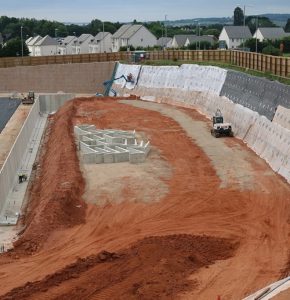10 benefits of using Soil Nails for your projects
Categories:
Company NewsSoil nails are a cost-effective method for long or short term stabilisation of steep existing or proposed slopes.

The stability of the slope is increased with the installation of steel or glass fibre threaded soil nails placed into pre-bored holes or simultaneous drilling and installation techniques. The end results along with the correct drainage significantly reduce the chances of a landslide or other ground movements. Whether it’s for roadway cut excavations, slope stabilisation or retaining wall support, soil nails are a versatile and practical form of earth retention used to prevent horizontal movement.
We take pride in being fully proactive with our clients to offer a one-stop design and build soil nail and ground anchor solution to enable our clients to rest easy in the knowledge that their contract is in safe hands. Soil nail walls exhibit numerous advantages when compared to alternative top-down construction techniques.
Check out our Top 10 benefits of using Soil Nails for your projects:
Less environmental impact compared to heavier construction methods
Can be installed in congested spaces as nails are typically shorter; particularly when compared to braced excavations
There is no need to embed any structural element below the bottom of excavation as with soldier beams used in ground anchor walls.
Soil nail installation is relatively rapid and uses typically less construction materials than ground anchor walls.
Nail location, inclination, and lengths can be adjusted easily when obstructions (cobbles or boulders, piles or underground utilities) are encountered.
Soil nailing is advantageous at sites with remote access because smaller equipment is generally needed.
Soil nail walls are relatively flexible and can accommodate relatively large total and differential settlements.
Measured total deflections of soil nail walls are usually within tolerable limits.
Soil nail walls have performed well during seismic events owing to overall system flexibility
Soil nail walls are more economical than conventional concrete gravity walls when conventional soil nailing construction procedures are used
Case Study
Main contractor McLaughlin & Harvey Construction Ltd awarded Aarsleff Ground Engineering the contract to supply and install a soil nailed wall to support the construction of a new IKEA store in Exeter, just off Newcourt Way near Sandy Park. Soil nailing has the benefit of a top-down construction method and therefore was deemed to be the smartest solution to allow the development to progress without significant loss of usable land. The land, which is a 115,882.00sq metre area, was bound to the South by a residential construction site and existing residential development.
To provide a level platform on which to construct the new IKEA store, Aarsleff cut into an existing slope 424m long and 9.8m high. Testing was carried out in advance of the main works to include the install and test of 6 No test nails between 5m and 8m long. Aarsleff then installed 1081no 32mm hollow self-drilling soil nails with a sacrificial drill bit to a 70° slope made up of Dawlish Sandstone, faced with a structural steel mesh cladded with a facing mesh and filled with a graded hardwearing local stone. The nails were installed with Aarsleff’s own Klemm 806 drill rig.
Read more:
The Latest. News, podcasts & projects






